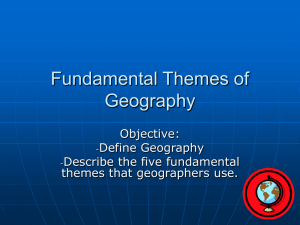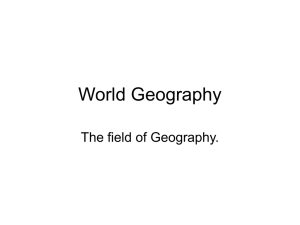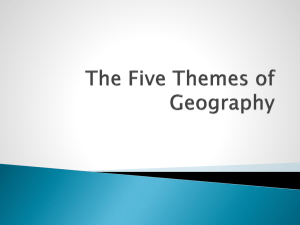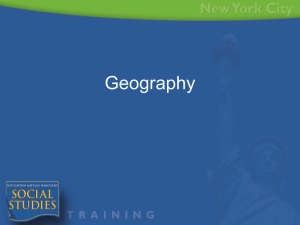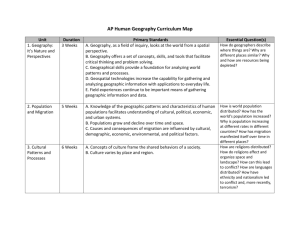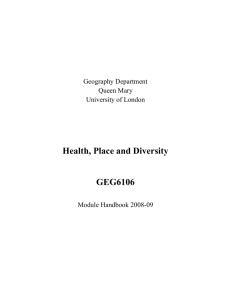Global-Cities-NinaMartin - Urban Geography Research Group
advertisement
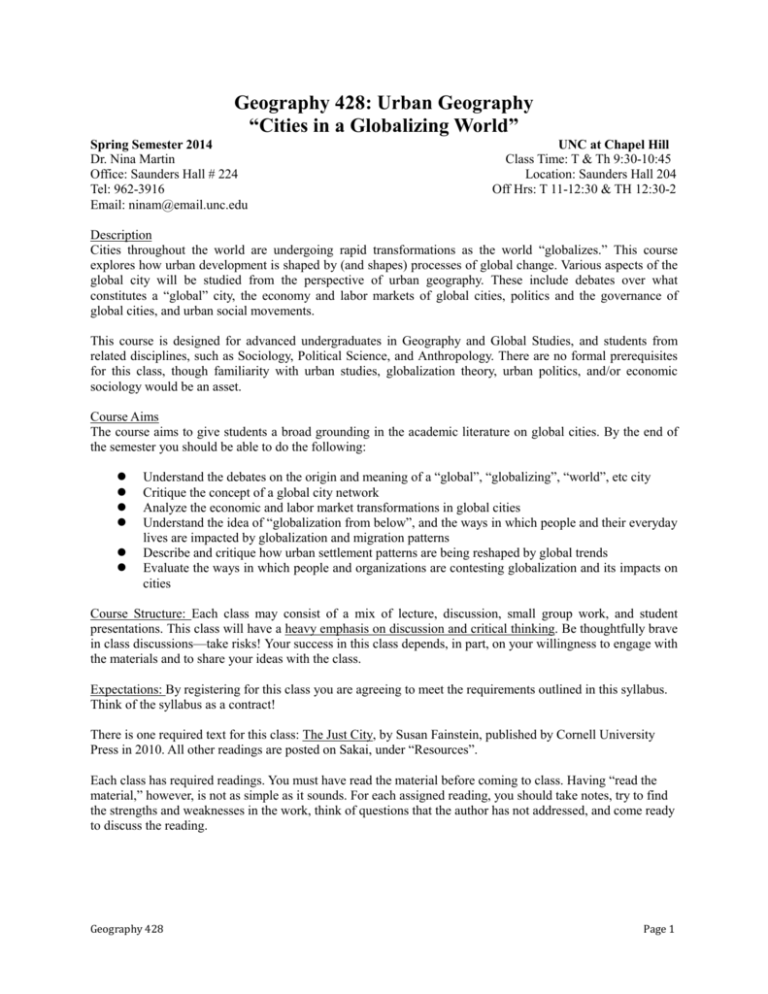
Geography 428: Urban Geography “Cities in a Globalizing World” Spring Semester 2014 Dr. Nina Martin Office: Saunders Hall # 224 Tel: 962-3916 Email: ninam@email.unc.edu UNC at Chapel Hill Class Time: T & Th 9:30-10:45 Location: Saunders Hall 204 Off Hrs: T 11-12:30 & TH 12:30-2 Description Cities throughout the world are undergoing rapid transformations as the world “globalizes.” This course explores how urban development is shaped by (and shapes) processes of global change. Various aspects of the global city will be studied from the perspective of urban geography. These include debates over what constitutes a “global” city, the economy and labor markets of global cities, politics and the governance of global cities, and urban social movements. This course is designed for advanced undergraduates in Geography and Global Studies, and students from related disciplines, such as Sociology, Political Science, and Anthropology. There are no formal prerequisites for this class, though familiarity with urban studies, globalization theory, urban politics, and/or economic sociology would be an asset. Course Aims The course aims to give students a broad grounding in the academic literature on global cities. By the end of the semester you should be able to do the following: Understand the debates on the origin and meaning of a “global”, “globalizing”, “world”, etc city Critique the concept of a global city network Analyze the economic and labor market transformations in global cities Understand the idea of “globalization from below”, and the ways in which people and their everyday lives are impacted by globalization and migration patterns Describe and critique how urban settlement patterns are being reshaped by global trends Evaluate the ways in which people and organizations are contesting globalization and its impacts on cities Course Structure: Each class may consist of a mix of lecture, discussion, small group work, and student presentations. This class will have a heavy emphasis on discussion and critical thinking. Be thoughtfully brave in class discussions—take risks! Your success in this class depends, in part, on your willingness to engage with the materials and to share your ideas with the class. Expectations: By registering for this class you are agreeing to meet the requirements outlined in this syllabus. Think of the syllabus as a contract! There is one required text for this class: The Just City, by Susan Fainstein, published by Cornell University Press in 2010. All other readings are posted on Sakai, under “Resources”. Each class has required readings. You must have read the material before coming to class. Having “read the material,” however, is not as simple as it sounds. For each assigned reading, you should take notes, try to find the strengths and weaknesses in the work, think of questions that the author has not addressed, and come ready to discuss the reading. Geography 428 Page 1 Graded Elements Requirement Attendance and participation Assignment 1 Midterm Presentation on readings Final Exam Paper & Presentation Percentage of grade 15% 5% 20% 10% 20% 30% Date Semester long Jan 21st March 4th in class Semester long—see asterisks (Sign-up sheet to be handed out in class on 1/21) Fri, May 2nd at 8am in Saunders 204 April 17th in class Attendance & Participation: Attendance for this class is mandatory and I will take attendance at each class and make note of who participates in discussions. If you miss classes without an acceptable excuse (e.g. serious illness, family emergency, etc.) your final grade in the course will be affected. I reserve the right to give surprise quizzes if I feel that students are not doing the reading, participating, or attending class. Do not arrive late for class. Late Assignments: You must have a documented medical condition or family crisis in order to hand in an assignment late without penalty. Otherwise, you will lose 10% of the value of the assignment for each day an assignment is late. Please contact me as soon as possible if, for any reason, you cannot hand in an assignment on time. Laptop Policy: I prefer no laptops in class as they contain so many temptations to engage in non-class related activities. If I find a student using a laptop for anything other than taking notes, I shall ban them from the classroom. Honor Code: This class follows that UNC honor code. As the Department of Geography’s liaison to the Honor Court, I take the honor code seriously. Please familiarize yourself with it: honor.unc.edu. Course Schedule Date Topic Reading TOPIC 1: What are Challenges and Promises of Urbanization in an Era of Globalization? 1/9 Course Intro Ron Martin, 2004, “Geography: Making a Difference in a Globalizing World” Stuart Hall, 2006, “Cosmopolitan Promises, Multicultural Realities” in Divided Cities. 1/14 No class held. Instead watch film, Requiem for Detroit, available at: http://documentaryheaven.com/requiem-for-detroit/ 1/16 No class held, instead complete Assignment 1 1/21 Assignment 1 due in class John Friedmann. 1986. “The World City The global city hypothesis Hypothesis.” 1/23 Sassen: What is the global city really about? Saskia Sassen, 2001, The Global City 2nd Capital?* edition, pages 3-21 1/28 Janet Abu-Lughod: What is a global city really Janet L. Abu-Lughod, 1999, America’s about? People?* Global Cities: New York, Chicago, and Los Angeles, pages 1-16 Not a city, but a network?* Beaverstock, Smith and Taylor. Geography 428 Page 2 1/30 World-City Networks Presentations Economies of Global Cities: Power and Polarization 2/4 Neoliberal Urbanism I* “World-city Network: A New Metageography?” Annals of the Association of American Geographers None -Rossi & Vanolo, Urban Political Geographies, 72-81 -David Harvey, 2005. Intro and Ch 1 from, A Brief History of Neoliberalism, Oxford University Press. 2/6 Neoliberal Urbanism II* -Rossi & Vanolo, Urban Political Geographies, 80-102 2/11 Do cities have power in the global marketplace?* H.V. Savitch and Paul Kantor, 2003, “Urban Strategies for a Global Era” in American Behavioral Scientist, 46 --Case studies on cities and power/economic growth posted to Sakai 2/13 Who lives and work in global cities? The rich? The --Simone Buechler. 2006. Sao Paulo: poor?* Outsourcing and Downgrading of Labor in a Globalizing City. From The Global Cities Reader, edited by Neil Brenner and Roger Keil. --David Ley. 2004. Transnational Spaces and Everyday Lives. Transactions of the Institute of British Geographers, 29 (151-164). Global City Image and the Politics of Representation 2/18 Politics of representation --Rossi & Vanolo, Urban Political Geographies, 26-30 & 38-40 2/20 Mega Projects and the landscape of representation* --Ute Lehrer. “Willing the Global City: Berlin’s Cultural Strategies of Inter-urban Competition After 1989” --Sharon Zukin. “The City as a Landscape of Power” R&V 40-41 2/25 Gentrification* Loretta Lees. 2008. Gentrification and Social Mixing. Urban Studies. 45 (12): 2449-2470. 2/27 Creative Class* -Richard Florida, 2002, excerpts from The Rise of the Creative Class -Rossi &Vanolo 51-59 --Deborah Leslie and JP Catungal. 2012. Social Justice and the Creative City. Geography Compass. 6/3, 111-122. 3/4 Midterm 3/6 Global City in Film and Fiction Readings TBA 3/11 Spring Break! &3/13 Evaluating city building: what is just? how are just cities constructed? 3/18 Theories of Justice* -Fainstein, Just City, Chapter 2 Geography 428 Page 3 3/20 3/25 3/27 4/1 New York* London* Amsterdam* Right to the City & Urban Social Movements* Case Study: South Central Los Angeles Farmers Film: The Garden 4/3 Film: The Garden 4/8 4/10 4/15 The Garden Association of American Geographers Conference Justice Movements, LA bus riders union* Final papers, class review and exam 4/17 ***Paper due*** Group presentations 4/22 Group presentations 4/24 Final class: Class summary and wrap-up Final exam: Fri, May 2nd at 8am in Saunders 204 Geography 428 Fainstein, Just City, Chapter 3 Fainstein, Just City, Chapter 4 Fainstein, Just City, Chapter 5 --Fainstein, Just City, Chapter 6 --David Harvey, “The Right to the City”, International Journal of Urban and Regional Research, 2003. -Rossi & Vanolo, Urban Political Geographies, 144-147 --Right to the City Alliance: http://righttothecity.org/ Irazabal and Punja, 2009, “Cultivating Just Planning and Legal Institutions”, Journal of Urban Affairs, 2009, 31(1). Homework discussion questions No class, work on final paper Joe Grengs, 2002, “Community-based Planning as a Source of Social Change: The Transit Equity Movement of Los Angeles’ Bus Riders Union”, JAPA, 68(2). Read classmates’ papers posted to sakai Read classmates’ papers posted to sakai Rossi &Vanolo, 179-181 Page 4




